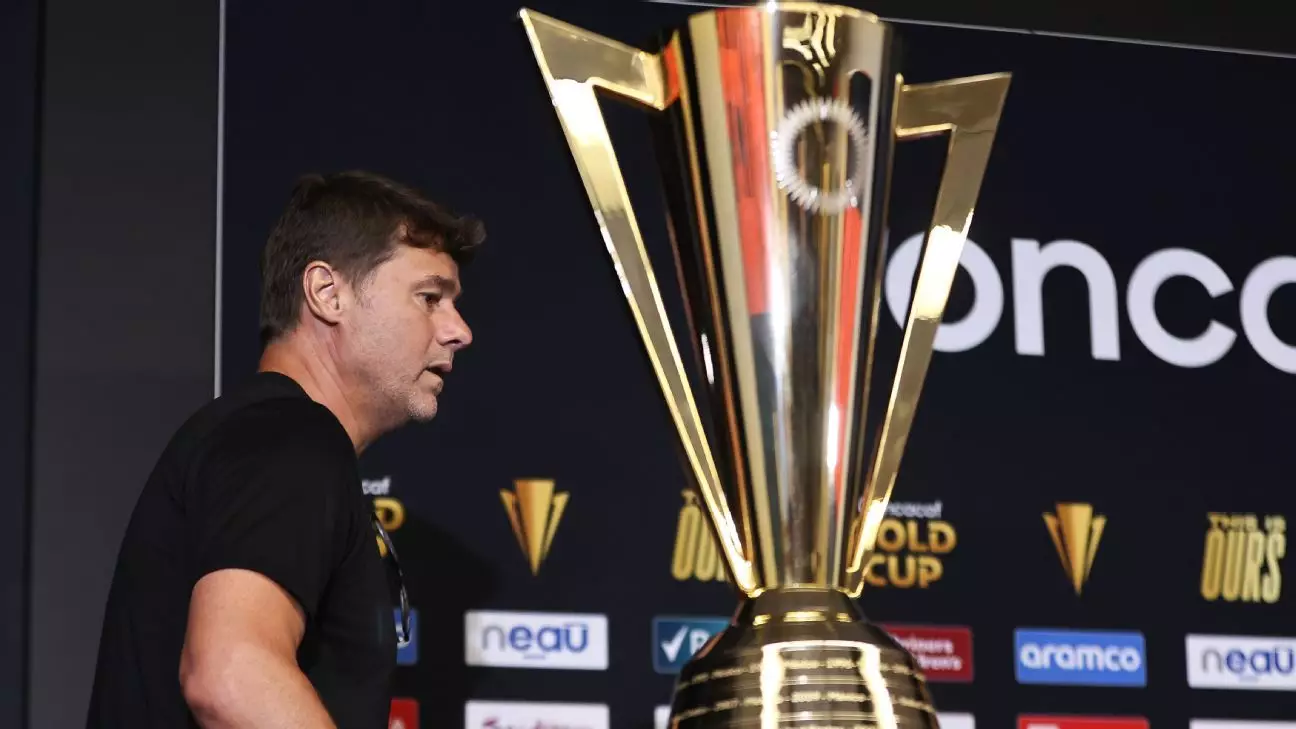In the tumultuous arena of competitive football, few elements are as potent as pressure. For the US men’s national team, the upcoming Gold Cup final against Mexico isn’t just a game; it’s a critical proving ground. According to head coach Mauricio Pochettino, navigating the intense emotions and stress of this high-stakes encounter is essential for the team’s growth—even if they have already secured their spot in next summer’s World Cup. This perspective reveals a bold philosophy: that adversity prepares athletes for future triumphs. Instead of shying away from pressure, Pochettino views it as a catalyst that sharpens skills, fosters resilience, and ignites a winning mentality.
Playing before a predominantly Mexican crowd at NRG Stadium only amplifies the stakes, making victory even more meaningful. For the US squad, this isn’t merely about a trophy but about molding character—transforming fleeting talent into unwavering mental toughness. As we analyze this approach, it becomes clear that true sporting excellence isn’t solely built on natural ability but on the grueling process of facing and overcoming pressure. The coach’s emphasis on stress as a developmental tool underscores a profound truth: great teams are forged not in comfort zones but in moments that demand everything.
The Cultural Significance of the Gold Cup and the Power of Rivalry
The upcoming clash is more than a statistical rivalry; it’s a battle woven into the fabric of North American soccer culture. Mexico’s quest for a record tenth Gold Cup title adds historical weight to the fixture, making victory a symbol of national pride. Meanwhile, the US team, despite missing key players, remains determined to challenge the dominance that Mexico has cultivated over years of competition. This rivalry fuels passion, elevates the stakes, and reminds fans and players alike that football extends beyond the pitch—it commands collective identity.
For the US, reaching the final was a commendable achievement, a clear testament to individual and team resilience. Yet, Mauricio Pochettino’s aspiration surpasses mere participation; he aims for victory, believing that conquering Mexico at this stage will serve as a vital mental conditioning for the World Cup. The significance lies in understanding that the encounter isn’t just about the trophy but about asserting confidence, building unity, and proving resilience under immense pressure. The match symbolizes a testing ground where psychological fortitude is as critical as tactical brilliance.
The Psychological Edge: Dreams as Motivation
Leadership in sport isn’t merely about tactics; it’s about inspiring a collective belief. Pochettino’s sharing of a personal dream before the match encapsulates this principle perfectly. By invoking imagery of victory and a desire to lift the trophy, he stokes the flames of ambition within his players. Such emotional arousal can be a game-changer, transforming mere aspiration into palpable determination. Malik Tillman’s recounting of the coach’s motivational message highlights the importance of belief—an intangible yet powerful force that often differentiates winners from the rest.
This sense of unity and shared purpose isn’t coincidental; it’s strategic. Pochettino recognizes that a close-knit team driven by a common dream can withstand external pressures and directional adversity. The narrative of dreams and the collective will to succeed serve as psychological armor, enabling players to perform at their highest level even in front of a noisy crowd and fierce rivalry. The mental preparation, therefore, becomes as vital as physical training, affirming that victory is often decided long before the final whistle blows.
The Unfinished Story of a Coach’s Quest
As Mauricio Pochettino seeks his first major trophy with the USMNT, the stakes transcend the competition itself. It’s about establishing a legacy, about transforming a team into a resilient powerhouse capable of withstanding the trials of world-stage tournaments. His focus on using pressure as a developmental tool reveals a forward-looking strategy—one that aims to embed mental toughness into the very DNA of his squad. Beyond the immediate goal of winning the Gold Cup, the match is a stepping stone toward cultivating a mature, unshakeable team ready for the challenges of the 2026 World Cup on home soil.
By deliberately courting pressure and adversity, Pochettino echoes the realist philosopher’s conviction that growth often requires discomfort. The upcoming game isn’t just a final; it’s a crucible, testing the mettle of a team eager to define its future. If they succeed, it won’t just be another trophy— it will be a testament to the power of embracing stress as an essential ingredient in the recipe for greatness.

Leave a Reply